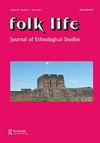One rough life, Ted Ashlaw: Adirondack lumber camp and barroom singer
IF 0.1
4区 社会学
0 FOLKLORE
引用次数: 0
Abstract
received knowledge to specific circumstances’ (234). The precarity of the fisherman’s trade is a central focus of this chapter and it comes as little surprise that the concept of danger is posited as one of the key reasons for the persistence of name avoidance practices over hundreds of years: ‘In the acutely unpredictable environment of the fisherman’s workplace, care must be taken not to upset the delicate balance of things, and avoidance was therefore the order of the day in the case of anything which might be suspect’ (240). The function of these practices is further elaborated in Chapter 6, ‘The naming-prohibitions and euphemisms at work’, in which the author examines the purpose served by the name avoidances by interpreting their role as ‘confidence builders and coping mechanisms’, as a means for encouraging focus and mental alertness while at sea, and as cultural markers of group identity (291–300). Cold Iron is an informed and insightful analysis of a previously under-researched topic in Irish folklore and it is sure to become a contemporary classic in Irish folklore studies and further afield. The book is beautifully designed by Red Dog and the maps, tables and graphs were compiled by Seán Ó Domhnaill of Media Services, University College Dublin. Photographs taken by the author and her colleagues of fishermen who participated in the study are interspersed with images from the photographic collection of the NFC and other archives. Profits and sales of this publication will be invested in conservation and publication of the National Folklore Collection, UCD.一个艰难的生活,Ted Ashlaw:阿迪朗达克木材营地和酒吧歌手
获得特定情况的知识”(234)。渔民贸易的不稳定是本章的重点,危险的概念被认为是数百年来持续存在的避税行为的关键原因之一,这一点也不奇怪:“在渔民工作场所这种极不可预测的环境中,必须注意不要破坏事物的微妙平衡,因此,在任何可能可疑的情况下,回避都是当务之急”(240)。这些做法的功能在第6章“工作中的命名禁令和委婉语”中得到了进一步的阐述,在该章中,作者通过解释其作为“信心建设者和应对机制”的作用,作为在海上鼓励注意力集中和精神警觉的手段,以及作为群体身份的文化标志,来检验名字回避的目的(291-300)。《冷铁》是对爱尔兰民俗学中一个先前研究不足的主题的一个有见地和深刻见解的分析,它肯定会成为爱尔兰民俗主义研究和更远领域的当代经典。这本书由Red Dog设计精美,地图、表格和图表由都柏林大学学院媒体服务部的SeánóDomhnaill编辑。作者和她的同事为参与研究的渔民拍摄的照片中穿插着NFC和其他档案馆的照片。该出版物的利润和销售额将投资于保护和出版UCD国家民俗收藏。
本文章由计算机程序翻译,如有差异,请以英文原文为准。
求助全文
约1分钟内获得全文
求助全文
来源期刊
CiteScore
0.30
自引率
66.70%
发文量
17
期刊介绍:
Folk Life: Journal of Ethnological Studies is a journal devoted to the study of all aspects of traditional ways of life in Great Britain and Ireland. The journal publishes original, high quality, peer-reviewed research in the form of unsolicited articles, solicited papers (which are usually selected from those read at the Society"s annual conference) and of members" papers (which are usually short reports of work in progress). Work published in Folk Life may include, for example, papers dealing with the traditional ways of life of other countries and regions, which may be compared to or contrasted with those of Great Britain and Ireland.

 求助内容:
求助内容: 应助结果提醒方式:
应助结果提醒方式:


